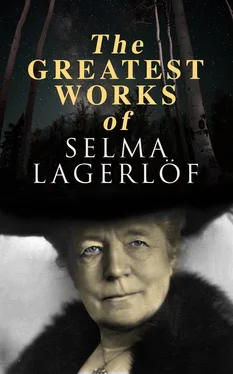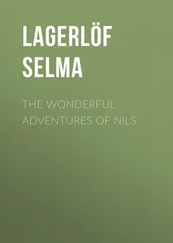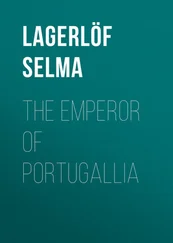As the boy listened to the last story, he looked very serious.
"I wonder what your object is in telling me all this?" he repeated.
Bataki twisted and turned and screwed up his eyes, and it was some time before he answered the boy.
"Since we are here alone," he said finally, "I shall take this opportunity to question you regarding a certain matter.
"Have you ever tried to ascertain upon what terms the elf who transformed you was to restore you to a normal human being?"
"The only stipulation I've heard anything about was that I should take the white goosey-gander up to Lapland and bring him back to Skåne, safe and sound."
"I thought as much," said Bataki; "for when last we met, you talked confidently of there being nothing more contemptible than deceiving a friend who trusts one. You'd better ask Akka about the terms. You know, I dare say, that she was at your home and talked with the elf."
"Akka hasn't told me of this," said the boy wonderingly.
"She must have thought that it was best for you not to know just what the elf did say. Naturally she would rather help you than Morten Goosey-Gander."
"It is singular, Bataki, that you always have a way of making me feel unhappy and anxious," said the boy.
"I dare say it might seem so," continued the raven, "but this time I believe that you will be grateful to me for telling you that the elf's words were to this effect: You were to become a normal human being again if you would bring back Morten Goosey-Gander that your mother might lay him on the block and chop his head off."
The boy leaped up.
"That's only one of your base fabrications," he cried indignantly.
"You can ask Akka yourself," said Bataki. "I see her coming up there
with her whole flock. And don't forget what I have told you to-day.
There is usually a way out of all difficulties, if only one can find it.
I shall be interested to see what success you have."
Table of Contents
Wednesday, October fifth .
To-day the boy took advantage of the rest hour, when Akka was feeding apart from the other wild geese, to ask her if that which Bataki had related was true, and Akka could not deny it. The boy made the leader-goose promise that she would not divulge the secret to Morten Goosey-Gander. The big white gander was so brave and generous that he might do something rash were he to learn of the elf's stipulations.
Later the boy sat on the goose-back, glum and silent, and hung his head.
He heard the wild geese call out to the goslings that now they were in
Dalarne, they could see Städjan in the north, and that now they were
flying over Österdal River to Horrmund Lake and were coming to Vesterdal
River. But the boy did not care even to glance at all this.
"I shall probably travel around with wild geese the rest of my life," he remarked to himself, "and I am likely to see more of this land than I wish."
He was quite as indifferent when the wild geese called out to him that now they had arrived in Vermland and that the stream they were following southward was Klarälven.
"I've seen so many rivers already," thought the boy, "why bother to look at one more?"
Even had he been more eager for sight-seeing, there was not very much to be seen, for northern Vermland is nothing but vast, monotonous forest tracts, through which Klarälven winds—narrow and rich in rapids. Here and there one can see a charcoal kiln, a forest clearing, or a few low, chimneyless huts, occupied by Finns. But the forest as a whole is so extensive one might fancy it was far up in Lapland.
Table of Contents
Thursday, October sixth .
The wild geese followed Klarälven as far as the big iron foundries at Monk Fors. Then they proceeded westward to Fryksdalen. Before they got to Lake Fryken it began to grow dusky, and they lit in a little wet morass on a wooded hill. The morass was certainly a good night quarter for the wild geese, but the boy thought it dismal and rough, and wished for a better sleeping place. While he was still high in the air, he had noticed that below the ridge lay a number of farms, and with great haste he proceeded to seek them out.
They were farther away than he had fancied and several times he was tempted to turn back. Presently the woods became less dense, and he came to a road skirting the edge of the forest. From it branched a pretty birch-bordered lane, which led down to a farm, and immediately he hastened toward it.
First the boy entered a farm yard as large as a city marketplace and enclosed by a long row of red houses. As he crossed the yard, he saw another farm where the dwelling-house faced a gravel path and a wide lawn. Back of the house there was a garden thick with foliage. The dwelling itself was small and humble, but the garden was edged by a row of exceedingly tall mountain-ash trees, so close together that they formed a real wall around it. It appeared to the boy as if he were coming into a great, high-vaulted chamber, with the lovely blue sky for a ceiling. The mountain-ash were thick with clusters of red berries, the grass plots were still green, of course, but that night there was a full moon, and as the bright moonlight fell upon the grass it looked as white as silver.
No human being was in sight and the boy could wander freely wherever he wished. When he was in the garden he saw something which almost put him in good humour. He had climbed a mountain-ash to eat berries, but before he could reach a cluster he caught sight of a barberry bush, which was also full of berries. He slid along the ash branch and clambered up into the barberry bush, but he was no sooner there than he discovered a currant bush, on which still hung long red clusters. Next he saw that the garden was full of gooseberries and raspberries and dog-rose bushes; that there were cabbages and turnips in the vegetable beds and berries on every bush, seeds on the herbs and grain-filled ears on every blade. And there on the path—no, of course he could not mistake it—was a big red apple which shone in the moonlight.
The boy sat down at the side of the path, with the big red apple in front of him, and began cutting little pieces from it with his sheath knife.
"It wouldn't be such a serious matter to be an elf all one's life if it were always as easy to get good food as it is here," he thought.
He sat and mused as he ate, wondering finally if it would not be as well for him to remain here and let the wild geese travel south without him.
"I don't know for the life of me how I can ever explain to Morten Goosey-Gander that I cannot go home," thought he. "It would be better were I to leave him altogether. I could gather provisions enough for the winter, as well as the squirrels do, and if I were to live in a dark corner of the stable or the cow shed, I shouldn't freeze to death."
Just as he was thinking this, he heard a light rustle over his head, and a second later something which resembled a birch stump stood on the ground beside him.
The stump twisted and turned, and two bright dots on top of it glowed like coals of fire. It looked like some enchantment. However, the boy soon remarked that the stump had a hooked beak and big feather wreaths around its glowing eyes. Then he knew that this was no enchantment.
"It is a real pleasure to meet a living creature," remarked the boy.
"Perhaps you will be good enough to tell me the name of this place, Mrs.
Brown Owl, and what sort of folk live here."
That evening, as on all other evenings, the owl had perched on a rung of the big ladder propped against the roof, from which she had looked down toward the gravel walks and grass plots, watching for rats. Very much to her surprise, not a single grayskin had appeared. She saw instead something that looked like a human being, but much, much smaller, moving about in the garden.
Читать дальше












